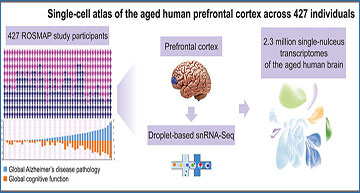Alzheimer’s disease (AD) is the most common cause of dementia worldwide, but the molecular and cellular mechanisms underlying cognitive impairment remain poorly understood. To address this, MIT researchers generated a single-cell transcriptomic atlas of the aged human prefrontal cortex covering 2.3 million cells from postmortem human brain samples of 427 individuals with varying degrees of AD pathology and cognitive impairment. Their analyses identified AD-pathology-associated alterations shared between excitatory neuron subtypes, revealed a coordinated increase of the cohesin complex and DNA damage response factors in excitatory neurons and in oligodendrocytes, and uncovered genes and pathways associated with high cognitive function, dementia, and resilience to AD pathology. Furthermore, the researchers identified selectively vulnerable somatostatin inhibitory neuron subtypes depleted in AD, discovered two distinct groups of inhibitory neurons that were more abundant in individuals with preserved high cognitive function late in life, and uncovered a link between inhibitory neurons and resilience to AD pathology.
Availability – https://www.synapse.org/#!Synapse:syn52293417
Mathys H, Peng Z, Boix CA, Victor MB, Leary N, Babu S, Abdelhady G, Jiang X, Ng AP, Ghafari K, Kunisky AK, Mantero J, Galani K, Lohia VN, Fortier GE, Lotfi Y, Ivey J, Brown HP, Patel PR, Chakraborty N, Beaudway JI, Imhoff EJ, Keeler CF, McChesney MM, Patel HH, Patel SP, Thai MT, Bennett DA, Kellis M, Tsai LH. (2023) Single-cell atlas reveals correlates of high cognitive function, dementia, and resilience to Alzheimer’s disease pathology. Cell 186(20):4365-4385.e27. [article]





